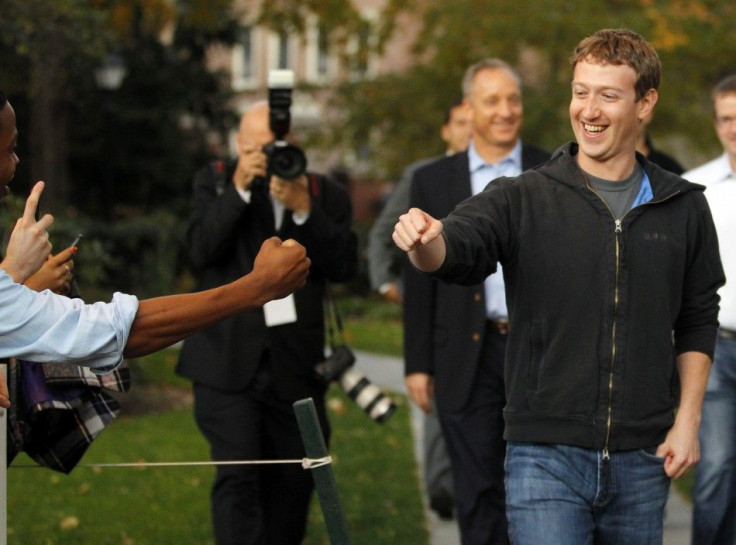Mark Zuckerberg Outlines Facebook Strategy in Charlie Rose Interview

The prolific 27-year-old co-founder of Facebook, Mark Zuckerberg, met up with distinguished TV interviewer Charlie Rose for a discussion about the future of his company and the web. Accompanying Zuckerberg was current COO of Facebook Sheryl Sandberg.
The two Facebook executives outlined the company's business strategy for the next five years and pointed out key differences between Facebook and Apple, Microsoft, Google and Amazon. Through much of the program, the two Facebook executives largely refuted Fast Company's idea of a Great Tech War of 2012, at least from Facebook's perspective.
Zuckerberg and Sandberg repeated several times through the program that Facebook does one thing really well, and that's all they're focused on. In essence, Facebook aims to shape the broader web by becoming a far-reaching social media tool that connects users to businesses, friends, family and more. Facebook has almost no interest in entering other markets aside from social media. Zuckerberg and Sandberg believe that the Social Era of the web is taking a large step forward from the Information Era of the web, one that was ruled by search engines and links.
The wisdoms of crowds versus the wisdom of friends, said Rose. That's the difference between Facebook and Google.
Sandberg corrected him: I think the 'wisdom of crowds' [doesn't only] apply to Google, but to a phase of the web, which was about information and links, said Sandberg. It was a lot of wonderful things mostly based on anonymity and links between the crowds.
[Facebook] just starts from a totally different place, so it is an evolution [of the web], said Sandberg. The information web still exists, it's still broadly used, but the social web didn't exist before. The social web can't exist until you are your real self online.
Zuckerberg went on to refute the idea of a burgeoning competition between Silicon Valley's biggest companies: There are a lot of ways in which the companies actually work together, there are real competitions in there, but I don't think this is going to be the type of situation where there's one company that wins 'all the stuff.'
Zuckerberg revealed that he thinks of differently about Google than other Silicon Valley companies: I think Google, in some ways, is more competitive, and [they're] certainly is trying to build their own little version of Facebook.
When I look at Amazon and Apple, I see companies that are extremely aligned with us, said Zuckerberg. I can't think of an Apple product or an Amazon product that I look at and think, 'Oh, that's really a threat to us.'
Sandberg echoed Zuckerberg's claim that Facebook is fundamentally different than the other tech giants of Silicon Valley: We only really want to do one thing: connect the world, said Sandberg. All of these companies are doing lots of different things, but we are still doing one thing.
Segueing from the discussion about Silicon Valley competition, Zuckerberg revealed Facebook's cardinal business strategy that differentiates it from other tech giants such as Google, Microsoft, Apple and Amazon: It is true we are focused on this one thing, [and] because there's all this other stuff out there, that means that Facebook has evolved as a partnership company, which is very different than the way that Apple or Google or Amazon or Microsoft or any of these other folks are.
If Apple or Google wants to build a product, they typically go build it, said Zuckerberg. If Facebook [wants] to help rethink the way people listen to music or watch movies, we build a platform on top of which people connect, and we enable all these companies, dozens of companies, to connect.
Our one thing that is the basis of our partnership strategy and our partnership approach is that we build the social technology, [and other companies] provide the [media], said Sandberg. We don't want people to use Facebook to watch movies or read newspaper articles. We want to provide the social technology.
Sandberg emphasized the importance of Facebook's ability to connect users to businesses: We do this one thing that underlies this huge partnership strategy, and it does make us pretty different than many of the other companies you're talking about.
The Facebook executives seemed supremely confident in the company moving forward. This comes at a time when other companies are scrambling to compete in new arenas. Google, which released its own social media platform called Google+, just opened up the platform to businesses; however, some think that Google+ was DOA. Amazon recently released its first LCD e-reader tablet, but faces stiff competition from the incumbent of the market, Barnes & Noble, who just released the Nook Tablet. Microsoft is losing market share in several arenas, including one that seemed almost impossible, its stronghold on global web browser usage. Apple is doing well strategically, but poses no immediate threat to Facebook since they make most of their revenue by selling products.
© Copyright IBTimes 2024. All rights reserved.





















